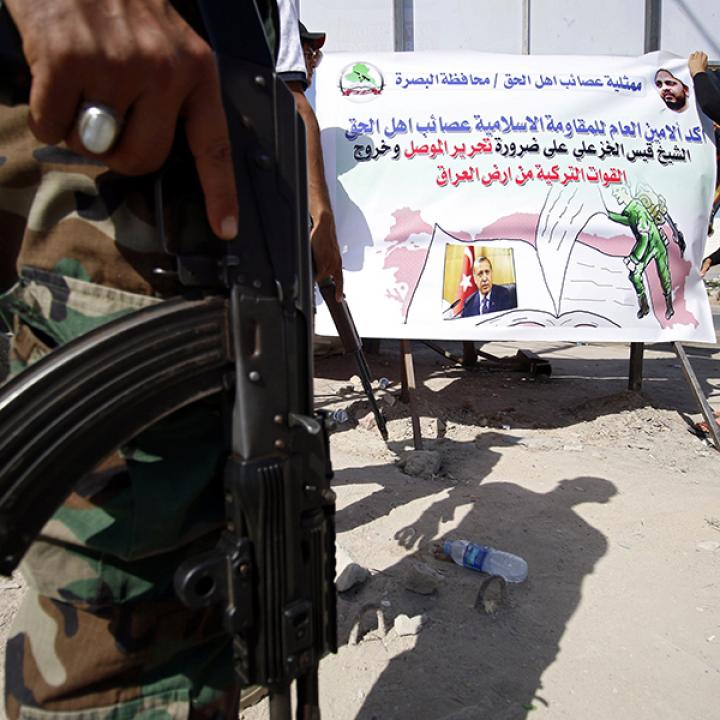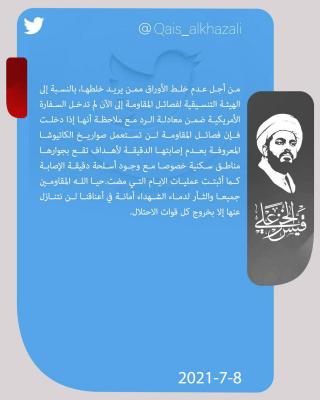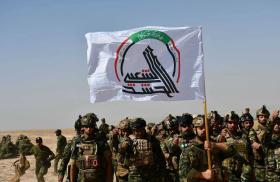
Are the Muqawama Signaling De-Escalation?

Although attacks on U.S. sites have surged, Iraqi militias appear to be laying the groundwork for de-escalation.
In the aftermath of the U.S. airstrikes on June 28, which targeted three Iranian-aligned militia positions in Syria and Iraq, muqawama (resistance) leaders and propaganda outlets made a barrage ofagainst U.S. troops in Iraq. As part of their escalatory language, militias discussed a “change in the equation”—meaning militia efforts to expel the U.S.-led coalition by force. The rhetoric was backed with action: in the past week, militias have launched attacks on the U.S. embassy, Erbil, and al-Asad Air Base (twice)—though in each case militia information operations exaggerated the extent and effect of the attacks. But even as the militias escalated, their leaders appeared to set the stage for de-escalation. It appears likely that the current round of escalation will calm once militias can claim to have responded commensurately to the U.S. strikes, allowing their leaders to satisfy their support bases.
One sign of this trend is that militia leaders have qualified their threats with calls for restraint. On July 8, senior Kataib Hezbollah (KH) figure Abu Ali al-Askari (a pseudonym) stated, “We call on our brothers in the muqawama fasail [resistance armed groups] to preserve rules of engagement and not to burn through the stages of battles with the enemy” (Figure 1). After a round of escalation, he appeared to leave the door open for more restraint.
Qais al-Khazali, the leader of Asaib Ahl al-Haq (AAH), has also combined fiery rhetoric with language implying restraint. On June 29, in a televised speech on al-Ahd TV (Figure 2), he initially described the militias' strategy of attrition warfare by saying, “The muqawama operations were [designed to] avoid bloodshed as much as possible…the tactic in the previous stage [before the June 28 U.S. airstrikes] was only to drain the enemy’s military capabilities.” He then went on to issue a threat to kill U.S. service personnel as revenge for the deaths of muqawama soldiers in U.S. airstrikes: “The revenge of the precious blood of our young men will be taken only by shedding blood of [U.S.] occupying soldiers.”
But Khazali then immediately toned down his language, speaking about the muqawama’s willingness to de-escalate after the latest round of attacks by citing the Quranic verse al-Isra 33: “And whoever is killed unjustly, we have given his heir authority, but let him not exceed limits in [the matter of] taking life” (translation from alquranenglish.com). He added, “If the American administration…learns the lesson then that’s it, we don’t have a problem, we could go back to the previous policy [of avoiding the deliberate killing of U.S. soldiers].”
These two muqawama leaders sent another signal of their willingness to de-escalate by denying any role in attacking the U.S. embassy in Baghdad. Askari’s July 8 statement reads, “The muqawama reject attacking diplomatic missions. The decision is to even avoid attacking the military base in the evil embassy of the United States (for now).” His statement came only a few hours after a tweet by Khazali that contained the same sentiment: “So far, the American embassy has not been part of the response equation of the Haya al-Tansiqiya” [referring to the committee that purports to coordinate militia activities] (Figure 3).
Following the June 28 airstrike, Iraqi militias came under fire from some of their radical supporters who demanded serious action against U.S. troops, with video evidence showing some leaders being harangued by their troops. Yet while the muqawama need to be seen as avenging their slain members, they do not necessarily need to kill American soldiers and risk retaliatory strikes in order to achieve that end—they need only create the perception of taking revenge. That is why the vast muqawama media network has been hard at work to exaggerate the scale and efficacy of their recent attacks.
In addition to satisfying their supporters, the muqawama must also balance the following objectives:
End the cycle of lethal retaliation. The militias can shrug off nonlethal U.S. strikes, but they draw a line at loss of life. Militias are signaling that the United States should answer material damage with material damage; this is what Khazali's "blood for blood" reference is seeking to deter. Sabereen News revealed this intent in a July 9 post, stating, “The muqawama are heading toward…changing the rules of engagement with the occupation…Whenever you strike one of our positions, we will target all your bases. (Figure 4).
Take Iran's strategic needs into account. Although it is likely that the Iraqi muqawama received consent from Iran for the latest uptick in attacks, militias are still likely subject to certain constraints imposed by Tehran in order to avoid derailing nuclear negotiations with the West.








